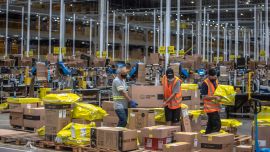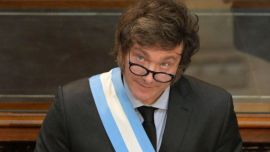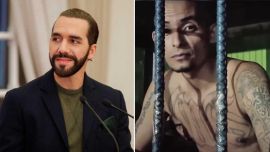Venezuelan President Nicolás Maduro called Wednesday for the normalisation of trade and diplomatic relations with Colombia, which have been non-existent since 2019 when the government refused to recognise him as Venezuela's leader.
"Colombia and Venezuela have to solve our problems in peace, we have to... normalise commercial, productive, economic relations," Maduro said in a speech on state television. "We have to normalize consular relations, diplomatic relations."
The left-wing leader welcomed a proposal approved Tuesday by Colombia's Senate to create a federal commission between the two countries to work on normalising commercial and diplomatic ties.
But Maduro also said that Colombians in Venezuela do not have consular assistance because President Iván Duque's government "does not give them consular access."
Duque, however, said he would not recognise Maduro's government.
"As long as I am the president of Colombia... we are not going to recognise him," he said during a joint press conference with US Secretary of State Antony Blinken.
"To recognise him would be giving up on the values that our country has historically defended. It would be a capitulation in the face of the misery that a whole people has had to live through because of the disgrace" of Maduro's government, he said.
Almost two million Venezuelans have migrated to Colombia in recent years, fleeing a severe economic crisis in their home country.
Caracas had unilaterally closed its land borders with Colombia in February 2019 amid a power struggle between Maduro and opposition leader Juan Guaidó, who claims to be his country's interim leader.
Guaidó has received support from around 60 countries, including the European Union, United States and Colombia.
Venezuela's government had also broken off diplomatic ties with Colombia due to Bogotá's recognition of Guaidó.
The neighbours share a border of some 2,200 kilometres (1,370 miles).
Bogotá has repeatedly accused the Venezuelan government of harbouring FARC and ELN guerrilla fighters, a claim Caracas denies.
Maduro, for his part, points the finger at Duque over alleged coup and assassination plots in his country.
But Venezuela announced on October 4 it was reopening the borders between the two countries.
In the midst of what he called a "turning of the page," Maduro invited Colombian businessmen to resume investments in his country, which is embroiled in its worst economic and social crisis in recent history, with hyperinflation and seven consecutive years of recession.
Capriles blasts 'deadly' opposition division
Former Venezuelan presidential candidate Henrique Capriles on Wednesday called on the opposition to end its "deadly" divisions and unite against the government in next month's regional elections.
After boycotting the last three national elections, the opposition has decided to contest mayoral and gubernatorial polls on November 21.
"We need to unite the opposition vote ... the dispersion of the vote is deadly. We cannot not unify our forces," said Capriles, who lost the 2012 election to then-president Hugo Chávez.
A year later, following Chávez's death, he was narrowly beaten again by Maduro.
Capriles urged opposition candidates to pull out if another figure opposed to the government is ahead of them in opinion polls.
"If you know who is first and who is second, what more does the one in second need to support the one in first? Is his ego more important?" said the 49-year-old. "The one in second needs to support the one in first."
The former Miranda governor pointed to the 2015 legislative elections where a united opposition managed to take a majority in legislative elections.
He asked: "Have we learnt nothing in 22 years" of the current populist government's grip on power? In 2015 we were millions and we won."
Despite the decision to contest the election, the fractured opposition has been unable to agree on unified candidates.
Without them, candidates aligned to Maduro's United Socialist Party "will win," said Capriles.
– TIMES/AFP

























Comments